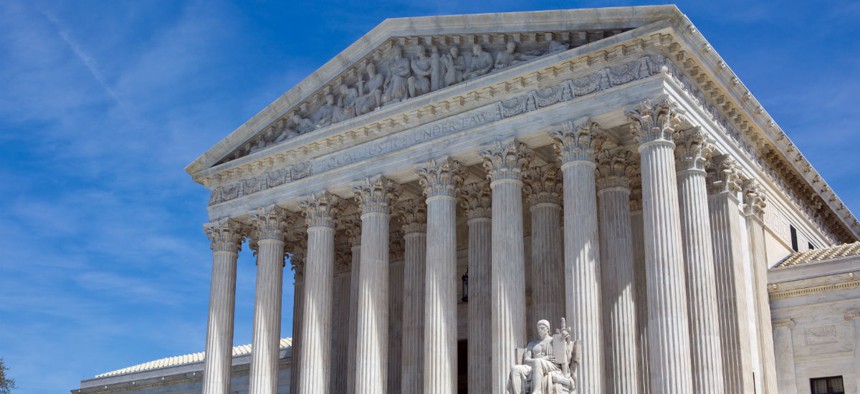Supreme Court to Hear Case That Could Reshape How Agencies Hire Some Employees
Court to decide if small group of employees must be appointed.
Several federal agencies could see their hiring mechanisms for certain civil service judge positions upended in a case the Supreme Court recently decided to hear.
The case, Lucia v. Securities and Exchange Commission, involves only administrative law judges at SEC, but attorneys representing the petitioners and legal experts said the fallout could be wider in scope. Those bringing the case before the Supreme Court have argued the ALJs, currently treated as civil servants, are actually “inferior officers” of the United States and therefore subject to the Appointments Clause of the Constitution.
Currently, all agencies hiring ALJs must select them from a database maintained by the Office of Personnel Management. Candidates must go through a rigorous screening and interview process that generally takes at least six months to complete. Agencies can then offer the position to a top-three list provided by OPM, or any existing ALJ. The Supreme Court will determine if agencies should continue to use that process or must instead onboard judges appointed by the president, a court or an agency head.
The petitioners and groups submitting “friend of the court” filings have argued the SEC has an unfair advantage with its internal hearings and the public should be able to hold accountable those who appoint the judges. The Justice Department originally challenged that argument, but the Trump administration has since reversed course and now takes the side of the petitioners. In November, Justice asked the Supreme Court to take the case.
The department’s solicitor general argued the ALJs' current job protections, such as appeal rights to the Merit Systems Protection Board, may violate separation of powers provisions of the Constitution. Congress may not, the solicitor general argued, place restrictions on the removal of officers of the United States.
The case could invalidate decisions ALJs have issued at SEC, according to a legal sidebar recently issued by the Congressional Research Service, and could also affect agencies across government.
“If the Supreme Court agrees with the Lucia petitioners and the Solicitor General that SEC ALJs are inferior officers,” CRS said, “its decision could have implications for the nearly 2,000 ALJs situated in other agencies across the federal government.”
Mark Perry, an attorney at Gibson Dunn representing the petitioners, said the case could apply to other agencies with ALJs who issue adversarial decisions. ALJs at agencies such as the Federal Energy Regulatory Commission, Federal Deposit Insurance Corporation and the Consumer Financial Protection Bureau—about 150 in total—might fall into that category. Perry said the Social Security Administration, however, which employs about 85 percent of the federal government’s ALJs, would likely fall into a separate category and his argument was taking no position on whether they were “officers” or “employees.”
A spokeswoman for SSA said the agency would not comment on pending litigation. The Justice Department did not respond in time for publication.
In a friend of the court filing, the Chamber of Commerce said it was important SEC ALJs be deemed officers “so that the public can easily discern and hold accountable the individual(s) responsible for their appointment.” The group also argued the current structure creates a “home court advantage” for the SEC in its proceedings. The SEC won 90 percent of cases it brought before its ALJs, the chamber said, compared to 69 percent of cases before district court judges.
Dallas Mavericks owner and ABC “Shark Tank” mainstay Mark Cuban also filed a brief in support of the challengers. Cuban said in his brief that he is a "first-hand witness to and victim of SEC overreach" and therefore had an interest in supporting the petitioners' claims.
A U.S. Appeals Court for the District of Columbia Circuit panel overrode lower courts in 2016 and denied a petition from San Diego-based financial adviser Raymond Lucia, who is contesting SEC allegations that he misled investors. The three appeals judges said the SEC judges did not need to be appointed directly by the commission because their decisions weren’t final and were subject to commission review. The D.C. Circuit then granted an en banc rehearing, but it deadlocked five-five.








